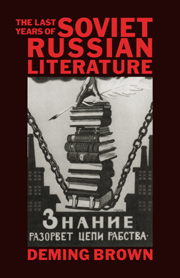Book contents
- Frontmatter
- Contents
- Preface
- Acknowledgments
- 1 The literary situation: publication, genres, criticism
- 2 From “stagnation” to “openness”
- 3 Retrospective writing about the Stalin period
- 4 Village prose: its peak and decline
- 5 The “forty-year-olds”
- 6 Other voices
- 7 “Tough” and “cruel” prose
- 8 New faces
- 9 Conclusion
- Notes
- Select bibliography
- English translations of Soviet Russian prose
- Index
1 - The literary situation: publication, genres, criticism
Published online by Cambridge University Press: 13 October 2009
- Frontmatter
- Contents
- Preface
- Acknowledgments
- 1 The literary situation: publication, genres, criticism
- 2 From “stagnation” to “openness”
- 3 Retrospective writing about the Stalin period
- 4 Village prose: its peak and decline
- 5 The “forty-year-olds”
- 6 Other voices
- 7 “Tough” and “cruel” prose
- 8 New faces
- 9 Conclusion
- Notes
- Select bibliography
- English translations of Soviet Russian prose
- Index
Summary
In an article published in 1991, the critic Sergei Chuprinin called the leadership of the Union of Soviet Writers a literary “general staff” whose function had been to “plan” and “command” the production of literature. Chuprinin was a member of the swelling chorus that demanded the extermination of the organization that had ruled over Soviet literature for nearly six decades. Through its ownership and control of publishing houses, literary journals, and newspapers, this Party-dominated monolith had served as the virtually omnipotent instrument of centralized, governmental supervision of literature. Its power was now coming to an end.
During the first dozen years with which the present book is concerned, through cronyism and patronage, reinforced by systems of censorship both formal and informal, the union's oligarchy – which writers increasingly referred to as a “mafia” – had largely succeeded in promoting the works of its adherents and stifling the publication of its enemies. Huge editions of the writings of official hacks, reinforced by commissioned, laudatory reviews, insured a wide distribution. For writers of independent temperament, accessibility to readers was difficult and often impossible.
A bold but for the moment unsuccessful challenge to this corrupt system occurred in 1979, when a group of writers, led by Vasilii Aksenov, Viktor Erofeev, Fazil Iskander, Andrei Bitov, and Evgenii Popov, assembled a large “literary almanac,” Metropol', containing works of twenty-three writers and poets, and demanded its uncensored publication. Refused, they sent two copies of the manuscript abroad, where it was published in Russian and in translation.
- Type
- Chapter
- Information
- The Last Years of Soviet Russian LiteratureProse Fiction 1975–1991, pp. 1 - 18Publisher: Cambridge University PressPrint publication year: 1993



